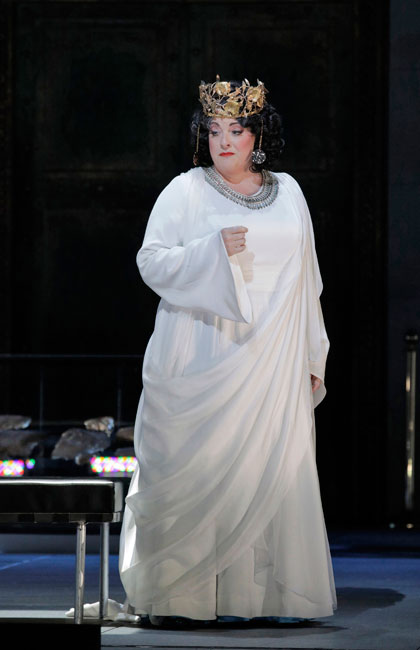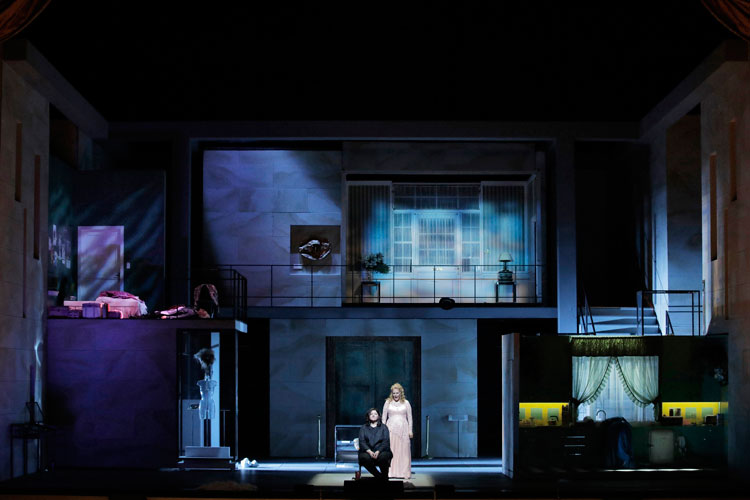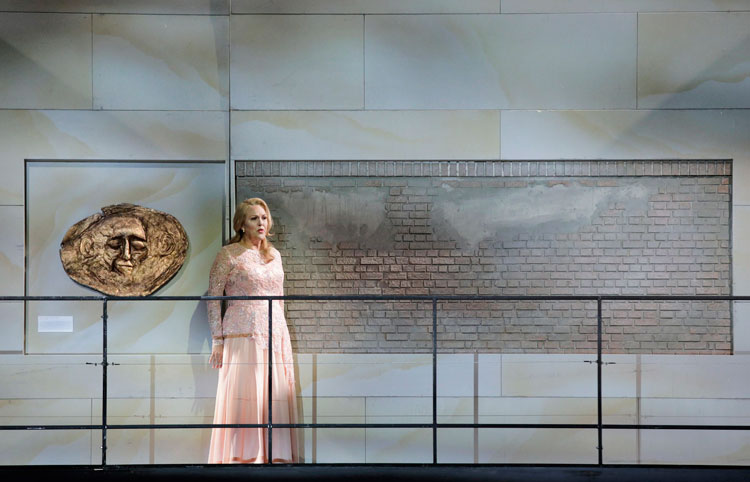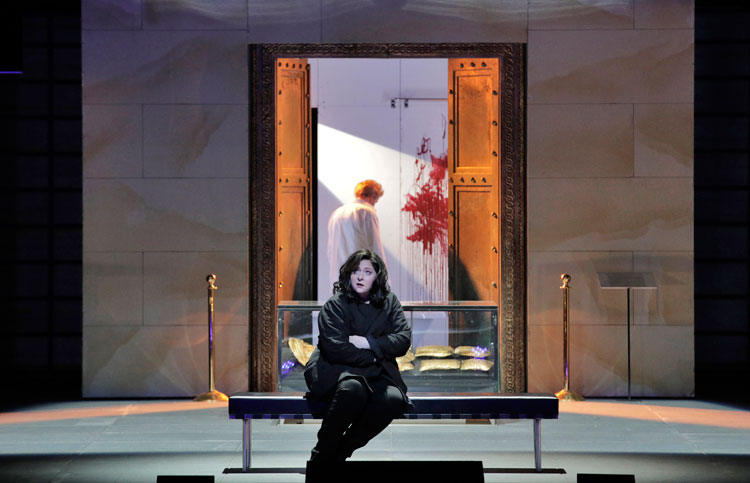
Christine Goerke in the title role of Richard Strauss’ ‘Elektra’ – Photo: Cory Weaver/San Francisco Opera
Drama, bloodlust and murder rule onstage at the War Memorial Opera House for the second production in San Francisco Opera’s 2017-18 Season – Richard Strauss’ Elektra – which opened this evening.
The inspiration for this work – Sophocles’ tragedy, Elektra – is a dark tale of the descent into insanity of the central figure, Elektra, the daughter of King Agamemnon,who becomes fanatical about avenging his death at the hands of her mother, Klytemnestra. Strauss’ opera, with a libretto by Hugo von Hofmannsthal, premiered in Dresden on January 25, 1909.
This San Francisco Opera production stars soprano Christine Goerke in the title role, with mezzo-soprano Michaela Martens as Klytemnestra. Soprano Adrianne Pieczonka is Elektra’s sister, Chrysothemis, bass-baritone Alfred Walker sings the role of Orest, their brother, and tenor Robert Brubaker is Aegisth, Klytemnestra’s lover.
A co-production with the National Theatre in Prague and the Badisches Staatstheater Karlsruhe, Elektra is directed in revival by the Staatstheatre’s director, Anja Kühnhold, and staged by English director Keith Warner, currently director of theatre studies for London’s National Opera Studio. The performances are led by Hungarian conductor Henrik Nánási.
Warner’s setting is a modern-day museum, where a girl becomes fixated by a display representing the fall of the house of Atreus in ancient Greece. She watches and re-watches a film relating the story of how Agamemnon was killed by Klytemnestra and her lover Aegisth, in revenge for Agamemnon’s having sacrificed his daughter, Iphigenia, to the gods. It shows Elektra’s brother, Orest, killing Klytemnestra and Aegisth, to satisfy his sister’s lust for vengeance, and although these murders initially give Elektra and Chrysomethis cause for celebration, when Elektra is left alone, the terrible burden caused by the death of her father becomes too much for her, and she descends into insanity and dies.
To the museum visitor – who is obviously also in mourning, and in a state of mental trauma – this story triggers a series of memories, and in her mind she takes on the persona of Elektra. She, too, must face her circumstances, going through the same torment as Elektra, until the harrowing events of this fantasy eventually take the same toll on her as on the central figure of Sophocles’ tragedy.
Name the finest opera houses in the world, and American soprano Christine Goerke has appeared on their stages. She’s performed with most of the world’s greatest orchestras and conductors as well, and her recording of Vaughan Williams’ A Sea Symphony with Robert Spano and the Atlanta Symphony Orchestra won the 2003 Grammy Award for Best Classical Recording and Best Choral Performance. It’s a while since Ms Goerke was first seen on the stage of the War Memorial Opera House – as Rosalinde in Johan Strauss II’s Die Fledermaus – and she comes to San Francisco Opera now in one of her greatest portrayals, the title role of Elektra.
Following her appearance in a concert version of Elektra with Andris Nelsons and the Boston Symphony Orchestra in 2015, the Wall Street Journal wrote of Ms Goerke’s “….. big, blazing soprano that not only has the gale-force power and sheen to slice through Strauss’ huge orchestra, but also seamless legato and an entire paintbox of colors”. The New York Times described her as “…. one of the most fearless and formidable dramatic sopranos of the day …. she brought effortless power, gleaming sound and dramatic intensity to this unforgettable Elektra ….”.
Mezzo-soprano Michaela Martins has become known for portrayals of some of the most challenging mezzo-soprano roles in the repertory – roles such as Judith in Bartók’s Bluebeard’s Castle, Kostelnička in Janáček’s Jenůfa, Herodias in Strauss’ Salome, Ortrud in Wagner’s Lohengrin and Kundry in Parsifal. A former participant in the Merola Opera Program, she first appeared with San Francisco Opera as Cassandra in Berlioz’s Les Troyens in 2015, following which Bachtrack wrote that her performance “…. carried a magnetism which enthralled as she projected with voluminous ease her character’s convictions with deep dark colours and a harrowing vibrato”. In this production of Elektra, Ms Martens sings Klytemnestra for the first time, a role which she will perform again in January for Houston Grand Opera.
Adrianne Pieczonka, whom The Independent describes as “simply magnificent, with a warm and radiant voice”, sings the role Elektra’s sister, Chrysothemis. It’s one that she has sung around the world, most recently at the Gran Teatre del Liceu in Barcelona and the Staatsoper in Berlin. Internationally renowned for her interpretations of Wagner, Strauss, Verdi and Puccini, Ms Pieczonka has portrayed powerful women such as Senta, Chrysothemis, Sieglinde, the Marschallin, the Kaiserin, Tosca, Elisabetta, and Amelia in leading opera houses and concert halls across Europe, North America and Asia.
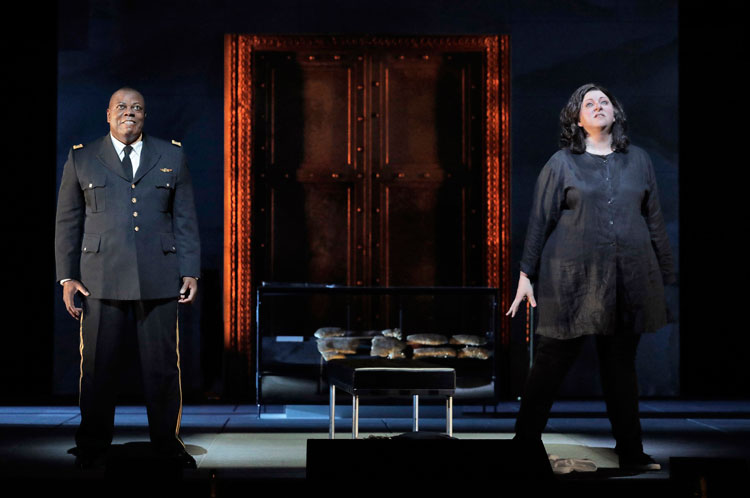
Alfred Walker as Orest and Christine Goerke in the title role of Strauss’ ‘Elektra’ Photo: Cory Weaver/San Francisco Opera
Alfred Walker, making his Company debut in the role of Orest, was highly praised by Die Welt, following a recent performance of Wagner’s Der fliegende Holländer at Theater Basel, the critic hailing him as “outstanding as The Dutchman… his performance fiery and chilling at the same time”. He has previously sung Orest, to great acclaim, at Teatro alla Scala, Seattle Opera, Deutsche Oper Berlin, and Spain’s San Sebastián Festival .
Robert Brubaker, who sings Aegisth, is also currently appearing as Emperor Altoum in San Francisco Opera’s production of Turandot, and will sing Guillot de Morfontaine in Manon later in the season. A frequent performer at the Metropolitan Opera, he has won acclaim for his portrayals of Mime in Wagner’s Siegfried and Das Rheingold, Maletestino in Zandonai’s Francesca da Rimini, the Witch in Humperdinck’s Hänsel und Gretel, and Chairman Mao in John Adams’ Nixon in China.

Christine Goerke as Elektra, Adrianne Pieczonka as Chrysothemis, and Alfred Walker as Orest in Strauss’ ‘Elektra’ – Photo: Cory Weaver/San Francisco Opera
Conductor Henrik Nánási makes his debut with San Francisco Opera, leading the cast, San Francisco Opera Chorus (Director Ian Robertson) and the unusually large Orchestra required by Strauss for Elektra. Maestro Nánási most recently held the post of General Music Director of the Komische Oper Berlin where he led new productions of Mazeppa, Eugene Onegin, Gianni Schicchi, La Belle Hélène, Die Zauberflöte, Così fan tutte, Don Giovanni, Bluebeard’s Castle, The Fiery Angel and Cendrillon, as well as revivals of Der Rosenkavalier, Rusalka, and Rigoletto. During his tenure, the Berlin company was named Opera House of the Year 2013 by Opera World Magazine and Opera Company of the Year 2015 at the Opera Awards.
This production of Elektra introduces to San Francisco Opera the work of set designer Boris Kudlička, costume designer Kaspar Glarner, lighting designer John Bishop and video designer Bartek Macias.
Richard Strauss’ Elektra, sung in German with English supertitles, will run at the War Memorial Opera House for six performances, until September 27. For further information and tickets, visit the San Francisco Opera website.
Sources:
San Francisco Opera program notes
Artists’ websites:
ArtsPreview home page

